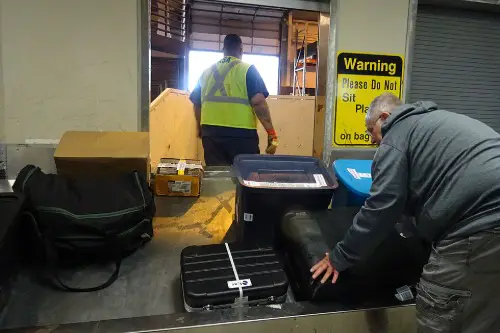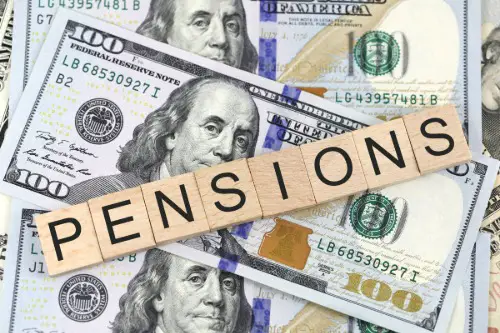1. Free Checked Baggage

Airlines used to let you check a bag or two without charging a dime, Hannah Towey of Condé Nast Traveler explains. But after the 2008 financial crisis, most major U.S. airlines introduced baggage fees under the guise of surviving tough times. The kicker? They never went back, even after posting record profits in the years that followed.
And somehow, travelers got used to it—some even praised budget airlines for offering “customizable” pricing. All that really meant was you had to pay extra for something that used to be standard. Now, we’re applauding “basic economy” while praying our carry-ons pass the size test.
2. Pensions

Remember pensions? That reliable paycheck after retirement, provided just for dedicating your working life to a company? Most private-sector employers quietly phased them out in favor of 401(k)s, shifting all the financial risk to workers, Elizabeth Guevara of Investopedia explains.
Instead of outrage, many people started celebrating the “freedom” of managing their own retirement. But let’s be real—most Americans aren’t financial advisors. Companies saved billions, while employees got saddled with the stress and complexity of investing wisely.
3. Personal Time Without Emails

There was a time when work ended at 5 p.m. and your boss couldn’t reach you until the next day. But with the rise of smartphones and remote work, companies started expecting 24/7 availability, according to Joanna York of the BBC. Work emails during dinner, Slack pings at midnight—it’s the new normal.
Somehow, we’ve labeled this as “flexibility” and “hustle culture.” But really, it’s just unpaid overtime in disguise. Companies love it because it boosts productivity without costing them more.
4. Break Rooms with Real Perks

Not long ago, it wasn’t weird to find office kitchens stocked with snacks, drinks, even the occasional catered lunch. These weren’t just perks—they kept morale up and helped employees feel valued. Then came the wave of cost-cutting and “efficiency” that gutted those little comforts.
Now, some companies boast about offering a Keurig and call it a benefit. Or they tell workers to appreciate the “culture” instead of material perks, Maria Haggerty of Inc.com explains. It’s wild how much we’ve lowered the bar and applauded them for it.
5. Job Training

Once upon a time, companies trained new employees extensively and invested in developing skills. It made sense—build up your people and you’d retain them. But over the last few decades, that investment shifted to workers themselves, who now have to pay for degrees, certificates, and even unpaid internships just to get in the door.
Companies call it “hiring for experience” or “lean operations.” What it really means is they’re not willing to teach anymore. And somehow, we’ve accepted that and shifted the burden onto job seekers.
6. Sick Days

Plenty of workers used to have generous sick leave policies, especially in unionized jobs. Over time, those were whittled down or combined into “PTO banks” that lumped vacation and sick time together. Get the flu? That’s your beach trip gone.
Somehow, this was spun as a win—more “flexibility” in how you use your time off. But in practice, it just forces people to work while sick or forgo vacations. And companies love it because fewer people actually use the days they’re entitled to.
7. Reasonable Work Hours

The 40-hour week was hard-won by labor movements, and for a while, it held strong. But tech companies and startups made overwork trendy, selling 60-hour weeks as “passion” and “ownership.” The lines between work and life blurred completely.
And incredibly, people started bragging about it—pulling all-nighters became a badge of honor. Meanwhile, companies got more labor for less pay. We mistook exploitation for ambition.
8. Privacy at Work

Office workers once had cubicles, doors, and a bit of solitude to focus. Then came the rise of open-plan offices, sold as promoting “collaboration” and “transparency.” But studies have shown they actually increase stress and reduce productivity.
Despite this, companies continue using them because they’re cheaper and allow for more surveillance. And workers? Many just grin and bear it, praising the “modern” layout. We’ve accepted less privacy as progress.
9. Job Security

It used to be normal to stay at a company for decades and retire with a gold watch. But the shift toward at-will employment and mass layoffs turned loyalty into a liability. Companies started downsizing at the first sign of trouble—or just to please shareholders.
Yet somehow, “job hopping” became the new norm, and people were told it gave them “more control” over their careers. The truth is, it’s survival. And companies were applauded for becoming “agile,” while employees were left disposable.
10. Reasonable Health Benefits

Many companies used to offer comprehensive health insurance at little to no cost. But over time, premiums, deductibles, and copays exploded while coverage shrank. High-deductible health plans are now common, shifting more costs onto workers.
Some companies even market it as “consumer-driven healthcare,” as if that’s empowering. In reality, people skip care because they can’t afford it. And corporations keep cashing in while appearing progressive.
11. Clear Career Paths

Climbing the ladder used to be relatively straightforward—you put in time, got promoted, moved up. But flatter org charts and “fluid” roles have made growth ambiguous at best. Now, employees are often left guessing how to advance.
Companies call it “nonlinear growth” or “self-directed careers.” What it really means is they’ve stopped mapping your path for you. And we’ve been tricked into thinking that’s empowering.
12. Lunch Breaks

Federal law doesn’t require lunch breaks, but culturally they used to be the norm—an hour away from your desk to eat and decompress. Nowadays, many people eat at their desks or skip meals entirely. “Power lunch” has become “working lunch,” and it’s taken for granted.
Some companies brag about having food on-site—not to nourish, but to keep people at work. And somehow, workers are grateful for pizza and ping pong instead of a real break. We’ve accepted burnout as dedication.
13. Control Over Our Data

Using a product used to mean buying it and being done. Now, every app, device, and website harvests your data to sell ads or train AI. Companies argue it helps “personalize” your experience, but it’s really about profit.
We’ve been nudged into clicking “accept” on everything, often without reading. And somehow, people cheer for more convenience while giving up privacy. The tradeoff wasn’t made clear, but the applause was loud anyway.


